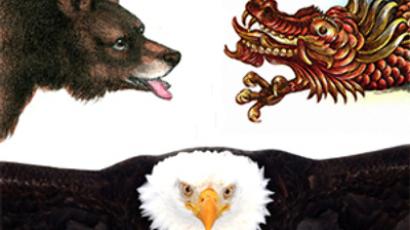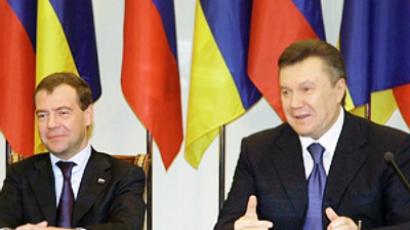Russia acquires the soft touch

From its reasonable response to the US “spy” case, to accepting responsibility for some unfortunate moments in history, Moscow is showing a fresh new face on the world stage.
Even before a plane that was carrying Polish President Lech Kaczynski, his wife, and 94 other high-ranking Polish dignitaries crashed in heavy fog in Smolensk in April en route to a 70th anniversary of the Katyn massacre, it was already clear that change was in the air.
Russian President Dmitry Medvedev had already acknowledged Stalin’s role in the execution of about 20,000 Polish officers in the Katyn massacre of 1940, and the Polish president’s visit was meant to put to rest bilateral tensions over the event.
“Stalin and the people who worked under his direction, leaders of the Soviet Union , carried out the crime. This is obvious,” the Russian president admitted.
But it was the immediate aftermath of the crash that really made it clear that Moscow was not simply following good PR advice.
Russian Prime Minister Vladimir Putin rushed to the scene of the tragedy, where he embraced Polish Prime Minister Donald Tusk following a flower-laying ceremony. At the same time, President Medvedev declared a national day of mourning, while Russia’s federal aviation authorities provided their Polish counterparts with all pertinent records of the air disaster.
Polish media also expressed its surprise that inclement weather – thanks to an Icelandic volcano ash cloud that had closed European air traffic for many days – did not prevent the Russian president from attending Kaczynski’s funeral.
“Despite many world leaders canceling their attendance at President Kaczynski’s funeral,” wrote The News, a Polish website, “Russian President Dmitry Medvedev left Moscow by plane, Sunday morning, bound for Krakow .”
Finally, Russian television broadcast “Katyn,” a 2007 film by director Andrzej Wajda that describes the tragedy through the eyes of the women; the mothers, wives and daughters of the victims executed on Stalin's orders by the NKVD in 1940.
“The behavior of Russia ’s leaders and citizens demonstrates that there’s been real change,” said Adam Rotfeld, Poland ’s former foreign minister. “Many issues can be resolved on the wave of the empathy toward Poles. This may turn out to be a breakthrough.”
But this was just the first test in what would turn into an extremely challenging summer for Moscow .
Countdown to Kyrgyzstan
After thriving for many years under the powerful sponsorship of the Soviet Union, the Central Asian nation of Kyrgyzstan rather quickly devolved into a nation wracked with mounting problems, mostly related to deep-seated nepotism, corruption and crippling poverty. These issues exploded to the surface on April 6 when the capital of Bishkek erupted in riots that spread across the nation like wildfire.
By April 15th, Kyrgyz President Kurmanbek Bakiyev was seeking sanctuary in Kazakhstan with his family, while the interim government was now in control of the Central Asian, landlocked country of about 6 million souls.
As the interim government was to soon discover, however, Kyrgyzstan ’s internal problems run far deeper than any temporary change of leadership can resolve.
On June 11, bloody clashes broke out between Kyrgyz and Uzbek ethnic groups in Osh, the second largest city in the country. Many Uzbek nationals were killed, while tens of thousands scrambled for the border. Interim leader Roza Otunbayeva promptly sent a letter to the President Dmitry Medvedev with a request to send Russian troops to help Bishkek put down the situation.
"The situation in Osh is out of control,” Otunbayeva said. “Attempts to establish dialogue have failed, and the fighting and rioting continues. We have appealed to Russia for help and are waiting for news; we hope that adequate measures will be taken in the earliest possible timeframe."
Moscow, to the surprise of some western observers, politely declined the invitation for an intervention.
Medvedev's spokeswoman, Natalya Timakova, said in reply to the letter, "It is an internal conflict and for now Russia does not see the conditions for taking part in its resolution".
The Russian government, however, said it would be sending humanitarian aid to the troubled nation: the clashes caused a severe shortage of food and other essential commodities with more than 200 killed and 1,685 people hurt as of June 12, 2010.
It is important to note that Moscow is no impartial observer to what happens in Kyrgyzstan.
Russia has operated a military air base near the town of Kant, some 20 kilometers east of Bishkek, since 1993. And since 2001, the Russians have been forced to share basing privileges with the US military, which opened its air facility shortly after the attacks of 9/11 to support its military operations in Afghanistan .
In February 2009, however, Bakiyev announced that he would close the Manas Air Base, the last US military outpost in Central Asia . The decision enjoyed overwhelming support in the Kyrgyz parliament, and some suspected that Moscow was pulling some strings. However, after negotiations between Kyrgyz, Russian and US diplomats, the decision to close the base was reversed in June 2009. The Americans were allowed to maintain their military presence, but the rent jumped from $17.4 million to $60 million annually.
In many western think tanks, it is practically taken for granted that “Russia is seeking to restore its empire.” Yet Moscow ’s decision to steer clear of trouble in Kyrgyzstan, respecting Bishkek’s sovereignty in good times and in bad, flies in the face of such worn-out thinking. After all, Russians understand better than anybody the burden of empire.
As one retired Russian diplomat explained the new approach, “We have much more to gain from building state-to state relations with our neighbors than by forcing ourselves upon them,” he said, adding that “We may plant our flag in the Arctic [in August 2007, a mechanical arm planted a rust-proof titanium flag painted with the Russian tricolor on to the Arctic seabed at a depth of 4,261 meters ( 13,980 feet )], but we have no desire to plant a Russian flag on somebody else’s soil. Those days are fortunately behind us.”
What about those spies?
Ask any Russian official about the now-fading US “spy scandal” and you will probably be greeted with a smile and a shake of the head. Indeed, few people in Moscow could have predicted this sinking curve ball from the Beltway, especially coming so soon after the successful “hamburger summit” between Medvedev and US President Barack Obama. But that doesn’t mean they are not taking it serious.
Some Russian political analysts quickly point to Obama’s political opponents in the Republican Party for sparking this anticlimactic spy dud; win some extra political points in the run-up to the fiercely contested midterm elections, which will certainly influence Obama’s remaining time in office. After all, US defense lobbyists are not averse to making boatloads of money off the image of Russia as a threatening bogeyman. That is a dangerous game that Obama is trying to avoid.
But the real story is not the dozen suburban spies who, after a 10-year FBI investigation, were not charged with a single incident of espionage. No, the real story is how Washington and Moscow worked together to resolve a rather embarrassing rift between them without either side resorting to Cold War posturing and hysterics. Moscow for its part even offered “consular assistance” as opposed to some Soviet-style Siberian deportation for its detained “spies”.
Even the traditional knee-jerk critics of Russia could not deny that something was very different this time around.
“When its Cold War spies got caught in the West, Moscow 's usual response was silence. The Kremlin refused with rare exceptions to acknowledge its undercover agents,” wrote Richard Boudreaux in The Wall Street Journal. “But after the U.S. arrested 10 members of what it called a deep-cover Russian espionage ring, Moscow was quick to admit that at least some were Russian citizens—a shift that offers an intriguing subplot to the spy story itself.”
This new approach to politics is apparently reflected in the Program for Effective Use of Foreign Policy in the Long-term Development of Russia, recently published in the Russian edition of Newsweek magazine, which sets out to reinvigorate relations in dozens of diverse countries.
The policy was drafted by Russian Foreign Minister Sergey Lavrov in response to President Medvedev’s demand for the nation’s foreign policy to support his main goal of rebuilding the national economy, and energizing relations with other countries.
Russia’s interests, according to the new policy, are served best by modernization, which requires Russia to forge powerful – and peaceful – alliances with major European countries, the United States, as well as rising economic powers like Brazil, China and India.
The Medvedev Method
On Monday, Medvedev called for alliances with the US and European Union in a new strategy aimed at attracting investment to the Russian economy at a time when "modernization" is high on the to-do list.
Russia is trying to wean itself from its over-dependence on oil, gas and metals exports, while attempting to streamline aging infrastructure, some of it left over from the Soviet period.
"We need special alliances for modernization… first of all with Germany, France, Italy, the EU in general, and with the United States," Medvedev said in a speech to Russian ambassadors.
"The foreign policy of our country… pursues one sole aim: to promote the growth of our citizens' prosperity in every way possible," he said.
Medvedev's Peter-the-Great-style modernizing efforts went to work on Thursday when he invited German companies to participate in the modernization of Russian companies.
"I hope that German structures will participate in the modernization of [Russian] companies, which are interesting to them, taking into account my decision on reducing the number of strategic enterprises," Medvedev said at a meeting with representatives of German business circles.
President Medvedev and German Chancellor Angela Merkel were in the Russian-German St. Petersburg Dialogue forum in the Russian city of Yekaterinburg.
Medvedev stressed that many Russian companies have been removed the list of the country's "strategic enterprises" and are being privatized, which makes investing into these ventures much easier.
In conclusion, it will be interesting to see how the western political think tanks – which seem to maintain their relevancy, not to mention government grants, when their subjects are large and threatening – will spin the new face of Russian politics to fit their desired worldview. Moeover, how will the Russian economy fare in the near future with Moscow more actively embracing potential partners and investors around the world?
With thanks to Evgeny Sukhoi for his contribution














